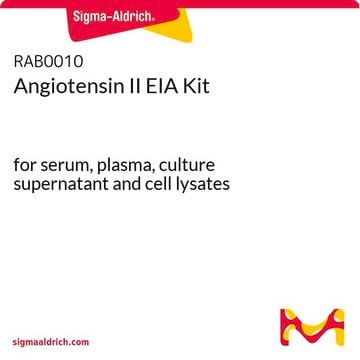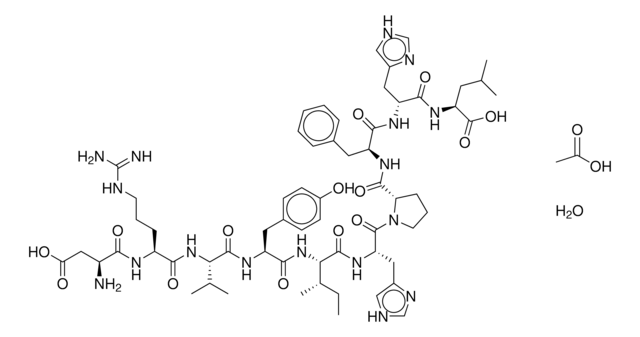AG782
Angiotensin Converting Enzyme, rat
Sinónimos:
ACE, CD143, DCP1, Peptidyl-dipeptidase A, Peptidase P
Iniciar sesiónpara Ver la Fijación de precios por contrato y de la organización
About This Item
UNSPSC Code:
12352204
eCl@ss:
32160405
NACRES:
NA.42
Productos recomendados
General description
ACE (kininase II, EC 3.4.15.1) is a zinc dipeptidyl carboxypeptidase. ACE catalyses both angiotensin I transformation to angiotensis II (a potent vasopressor agent) and degradation of bradikinin, a vaso-depressor. ACE appears to play a key role in regulating vascular tone and remodeling the development of atherosclerotic lesions. Increasing evidence suggests that ACE plays an important role in vascular pathology. Recent studies shows two new functions of this important enzyme: 1) It enhances the presentation of endogenous antigens (in particularly HIV 1 gp160-derived peptide p18) to MHC class I-restricted T-lynphocytes (ref. 1); 2) Its amino-terminal domain cleaves effectively hemoregulatory tetrapeptide N-Ac-Ser-Asp-Lys-Pro (ref. 2,3) which is involved in the control of hemapoetic stem cell proliferation (the amount of this peptide greatly decreases in patients undergoing cancer chemotherapy) (ref. 4).
Product Source: Isolated from rat lung using affinity chromatography (ref. 5).
Application
As a reference in SDS-PAGE and Western blotting [together with anti-ACE monoclonal (MAB4051) also available from Chemicon]. For Western blotting 500 ng/lane if gel is developed with anti-ACE MAB4051.
As a reference antigen for immunoprecipitation of ACE from various tissue samples (in combination with anti-ACE MAB4051).
As a source of pure ACE for different enzymatic studies of ACE (testing of ACE inhibitors, substrate specificity, kinetic measurements, etc.).
Optimal working concentration must be determined by the end user.
As a reference antigen for immunoprecipitation of ACE from various tissue samples (in combination with anti-ACE MAB4051).
As a source of pure ACE for different enzymatic studies of ACE (testing of ACE inhibitors, substrate specificity, kinetic measurements, etc.).
Optimal working concentration must be determined by the end user.
Unit Definition
Specific Activity: One unit will produce 1 μmoL of hippuric acid or His-Leu from Z-Phe-His-Leu per minute in 0.1 M phosphate buffer and 300 mM NaCl at pH 8.3 at 37°C.
Physical form
Liquid in 100 mM phosphate buffered saline, 150 mM NaCl, pH 7.4 with 0.2mM CHAPS. Purity is >95% by SDS-PAGE when 10 μg was loaded. Contains no preservative.
Other Notes
Concentration: Refer to Certificate of Analysis for each individual lot of this enzyme.
Legal Information
CHEMICON is a registered trademark of Merck KGaA, Darmstadt, Germany
Storage Class
12 - Non Combustible Liquids
wgk_germany
WGK 2
flash_point_f
Not applicable
flash_point_c
Not applicable
Certificados de análisis (COA)
Busque Certificados de análisis (COA) introduciendo el número de lote del producto. Los números de lote se encuentran en la etiqueta del producto después de las palabras «Lot» o «Batch»
¿Ya tiene este producto?
Encuentre la documentación para los productos que ha comprado recientemente en la Biblioteca de documentos.
Los clientes también vieron
K J Rieger et al.
The Biochemical journal, 296 ( Pt 2), 373-378 (1993-12-01)
The degradation of N-Ac-Ser-Asp-Lys-Pro (AcSDKP), a negative regulator controlling the proliferation of the haematopoietic stem cell, by enzymes present in human plasma, has been investigated. Radiolabelled AcSD[4-3H]KP ([3H]AcSDKP, 1 mM) was completely metabolized in human plasma with a half-life of
Pig kidney angiotensin converting enzyme. Purification and characterization of amphipathic and hydrophilic forms of the enzyme establishes C-terminal anchorage to the plasma membrane.
Hooper, N M, et al.
The Biochemical Journal, 247, 85-93 (1987)
A Rousseau et al.
The Journal of biological chemistry, 270(8), 3656-3661 (1995-02-24)
Angiotensin I-converting enzyme (ACE) is a zinc-dipeptidyl carboxypeptidase, which contains two similar domains, each possessing a functional active site. Respective involvement of each active site in the degradation of the circulating peptide N-acetyl-seryl-aspartyl-lysyl-proline (AcSDKP), a negative regulator of hematopoietic stem
Nuestro equipo de científicos tiene experiencia en todas las áreas de investigación: Ciencias de la vida, Ciencia de los materiales, Síntesis química, Cromatografía, Analítica y muchas otras.
Póngase en contacto con el Servicio técnico










